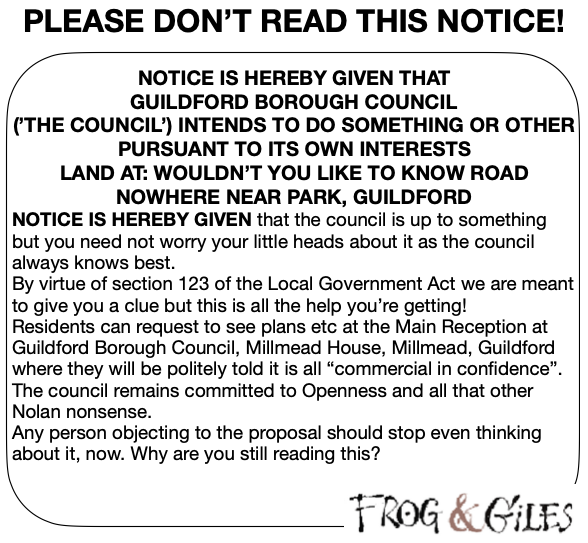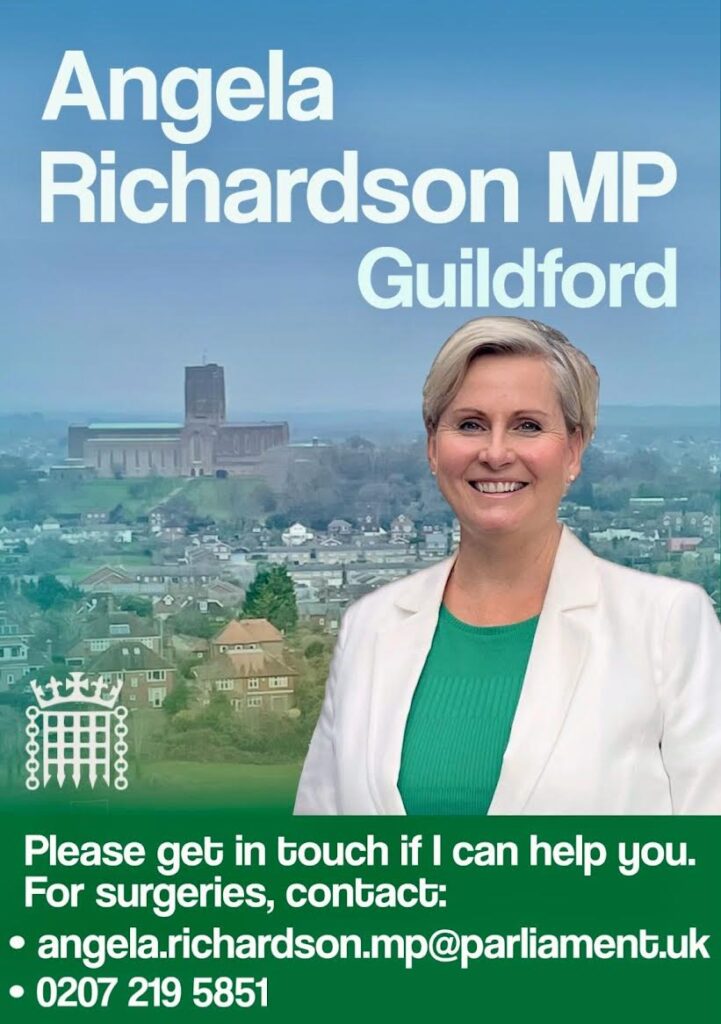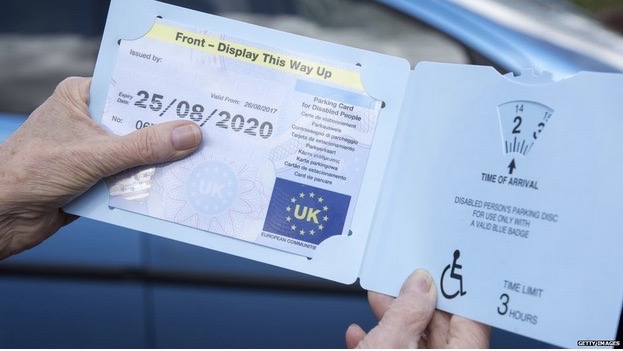 Abraham Lincoln
If given the truth, the people can be depended upon to meet any national crisis...
Abraham Lincoln
If given the truth, the people can be depended upon to meet any national crisis...
 Guildford news...
for Guildford people, brought to you by Guildford reporters - Guildford's own news service
Guildford news...
for Guildford people, brought to you by Guildford reporters - Guildford's own news service
No Visible Disability? Not Much Blue Badge Chance in Surrey
Published on: 7 Jan, 2021
Updated on: 9 Jan, 2021
Surrey has the UK’s second-highest refusal rate of Blue Badge parking badges for applicants with non-visible disabilities.
For the 12 months after August 30, 2019, 1,063 applications were allowed from those suffering “hidden disabilities” but only 274 were approved, a 65% refusal rate. Only Nottinghamshire had a greater rate with 69%, shows data compiled by the BBC.
Overall in Surrey, just more than 90% of the 16,997 applications were granted, revealing the large discrepancy in the approval rate for visible and hidden disabilities.
But the situation is improving, a county council spokesman claimed. “We understand how important a Blue Badge can be to a disabled person,” he said. “Having one means they can park closer to their destination to access essential goods, services, and other facilities.
“Between January 1 and December 31, 2020, we issued more than 4,300 disabled parking badges to Surrey residents. Of applicants who applied under the non-visible disability criteria 52% were successful.
“Each Blue Badge application is assessed on its own merits, based on the supporting information provided by the applicant and in line with the eligibility criteria set out by the Department for Transport [DfT].
“Our assessment process is based on best practice and we use independent, medically qualified expert assessors to inform our decision-making where required and particularly in complex cases involving non-visible disabilities.
“A diagnosed medical condition in itself does not make someone eligible for a Blue Badge; the condition must impact their mobility and overall ability to undertake journeys to such an extent that they meet the eligibility criteria set out by the DfT.
“Since the legislation expanding the eligibility criteria came into effect on August 30, 2019, we have worked to raise awareness among Surrey residents about the Blue Badge process for those applying under the non-visible disability criteria, in particular the supporting information that needs to be supplied.”
Nationally, of the 216 councils asked by the BBC, 109 were able to provide a breakdown of how they handled Blue Badge applications for physical impairments and for applicants with non-visible disabilities.
Of the 109, 92 councils had higher approval rates for physical impairment applicants.
For 10 councils, including Surrey, the approval rate was more than 50 percentage points higher for physical impairment applications.
The Blue Badge permit scheme was extended a year ago to include people with non-visible disabilities such as autism, dementia and anxiety.
The DfT said it would review the impact of the new criteria.
The National Autistic Society said the BBC’s analysis revealed how important it was for councils to improve staff training to ensure they understood when people should be entitled to a “lifeline” Blue Badge parking permit.
Tim Nicholls, from the National Autistic Society, said a badge could help journeys with a carer for someone with autism who may not be able to understand or react to the dangers of the road.
The permit could also help someone with autism overcome their anxiety over not finding a parking space or things going wrong on a trip, which could stop them from leaving the house entirely, he said.
People who had applied online also told us of the “trauma” of having to produce evidence of their disabilities to be scrutinised, and the difficulty of completing the form.
They also spoke of their reluctance to send original personal identity documents such as birth certificates in the post.
The removal of accessible parking bays next to shops and amenities “overnight, without any consultation” to allow for social distancing during the pandemic had also had a “massive impact” on disabled people, the disability equality charity Scope said.
James Taylor, their executive director of strategy impact and social change, added: “This new data shows a shocking disparity between the allocations of Blue Badges to people with invisible and visible impairments.
“Our helpline has also heard from disabled people with hidden impairments being denied a Blue Badge, for ‘not qualifying’.
“This research highlights the urgent need for staff training of the decision-makers in the councils, so they can recognise and understand the range of hidden impairment. Councils need also to understand the devastating impact their negative decision can have.”
Cllr David Renard, Transport spokesperson for the Local Government Association, which represents councils’ interests, said: “Councils want to make sure local services and communities are as accessible as possible and they work closely with health professionals to ensure fair and robust criteria are used in the allocation of Blue Badges to local residents, including those with non-visible disabilities.
“Councils also have to try to strike a balance when making changes to their communities and places to ensure there are parking spaces available for everyone at all times of the day and we can keep traffic moving.
“With 10 million more cars on the road in the past 20 years, an increase of a third, this has become increasingly challenging for them.”
Surrey County Council did not provide data to the BBC on the number of Blue Badge parking spaces in the county.
DfT guidance states that 5% of street parking be designated for Blue Badge holders. For car parks, the recommended level varies according to the main use of the car park and its size, but is between 2% and 6% of total capacity.
Responses to No Visible Disability? Not Much Blue Badge Chance in Surrey
Leave a Comment Cancel replyPlease see our comments policy. All comments are moderated and may take time to appear.

See Dragon story: GBC’s Explanation of Major Land Sale Notice Error ‘Borders on Arrogant’ Says Councillor






Recent Articles
- New Approach to Mental Health Concerns Reported to the Police
- Letter: Bernard Quoroll ‘s Insight Should Be Heard
- Police and Crime Commissioner Candidate Interview – Paul Kennedy
- Staff Union Warns Surrey University of No Confidence Votes
- Invitation to Join Mass Bike Ride on Saturday, April 27
- Thames Water Clarify Compensation Payments
- Surrey Fire and Rescue Service Urges Us All To Be ‘Wildfire Aware’
- Police and Crime Commissioner Candidate Interview – Lisa Townsend
- Insights Part 3: The Council Should Not Be Marking Its Own Homework
- Notice: In Our Own Words


Recent Comments
- Bibhas Neogi on M25 Junction 10 Project Required Major Engineering to Overcome Pipeline Snag
- Roland Dunster on Birdwatcher’s Diary No.302
- J Davies on Insights Part 3: The Council Should Not Be Marking Its Own Homework
- Angela Richardson on Insights Part 3: The Council Should Not Be Marking Its Own Homework
- Peter Wilkinson on Anger Over Traffic Impact of Golf Club Scheme
- Nicola King on Anger Over Traffic Impact of Golf Club Scheme
Search in Site
Media Gallery
Dragon Interview: Local Artist Leaves Her Mark At One of England’s Most Historic Buildings
January 21, 2023 / No Comment / Read MoreDragon Interview: Lib Dem Planning Chair: ‘Current Policy Doesn’t Work for Local People’
January 19, 2023 / No Comment / Read MoreA3 Tunnel in Guildford ‘Necessary’ for New Homes, Says Guildford’s MP
January 10, 2023 / No Comment / Read More‘Madness’ for London Road Scheme to Go Ahead Against ‘Huge Opposition’, Says SCC Leader
January 6, 2023 / No Comment / Read MoreCouncillor’s Son Starts Campaign for More Consultation on North Street Plan
December 30, 2022 / No Comment / Read MoreCounty Council Climbs Down Over London Road Works – Further ‘Engagement’ Period Announced
December 14, 2022 / No Comment / Read MoreDragon Interview: GBC Reaction to the Government’s Expected Decision to Relax Housing Targets
December 7, 2022 / No Comment / Read MoreHow Can Our Town Centre Businesses Recover? Watch the Shop Front Debate
May 18, 2020 / No Comment / Read More







Ian Stronge
January 7, 2021 at 11:06 am
What are Surrey County Council’s equivalent figures are for bus passes?
Martin Elliott
January 7, 2021 at 12:50 pm
This is an interest of mine as a holder of one for older persons.
Many people believe, though under threat from HMG, that as TfL issues a Travel Pass at age 60, this is a statutory benefit. Not so.
Its all on SCC web site:
“You may be eligible for a free bus pass if you’re a Surrey resident over the pensionable age you will be eligible when you are 66.”
Although it says “A free bus pass allows eligible senior Surrey residents to travel on buses free of charge.” I’m not sure that’s nationally. Of course, the valid time is limited as well.
I believe also Guildford P&R is also not free, just reduced.
https://www.surreycc.gov.uk/roads-and-transport/buses-and-other-transport/tickets-and-discounts